The land of the $20 smartphone
Why Myanmar is becoming the world's mobile-first test-bed
It may be a mobile miracle, but Myanmar remains on the United Nations' list of 'least developed countries’; its GDP per capita is $5,500 / £4,479 / AUS$7,340, and only 16% of rural homes have power.
According to the World Bank, 37.5% of the population lives in poverty. But somehow, while feature phones are all the rage in countries in southeast Asia – and the odd market stall here does stock the low-power devices – Myanmar has largely been able to skip straight to handsets capable of running apps.
“Most phones are sold by mom and pop shops around the country for between $30-40, which will give you Facebook, Viber and YouTube connections,” says Jones, who thinks that the raging popularity of these apps is making all of them hugely attractive platforms inside Myanmar.
"The digital footprint here is huge, and it changes the way products and services can be distributed – this is a mobile-first country.”
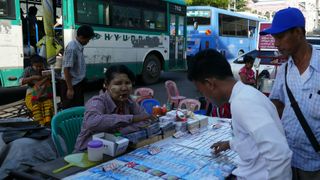
Worldpay's Thornton adds: “Myanmar is a perfect storm of e-commerce opportunity. A stabilising government with pro-economic policies, a huge wave of economic development, and significant investment into technology and communications make it the world’s fastest growing mobile market.“
That economic development is tricky in one way: Myanmar has no significant banking system.
Cue an economy built almost exclusively on apps. At least, that’s the hope behind services like recently-launched Wave Money, an example of using your phone as a primary means of payment.
Get daily insight, inspiration and deals in your inbox
Get the hottest deals available in your inbox plus news, reviews, opinion, analysis and more from the TechRadar team.
“Myanmar is a perfect storm of e-commerce opportunity.“
Stuart Thornton, Worldpay
Users access an account via an app, pay cash in at a Wave shop (there are 4,500 Telenor shops across 50% of the country already), then send it to anyone else using their national identity card number.
"Only about six per cent of people in the country have a bank account, and there are 3.1 bank branches per 100,000 population,” says Jones. That’s the same level as South Sudan, Haiti and Afghanistan.
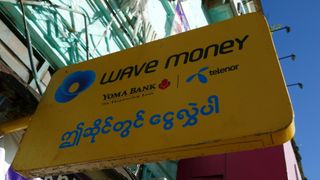
There are also strong social benefits to enabling this easy transfer of money around the country: Myanmar is a place where it’s common for people to work away from their families, and phones allow them to send money back home.
"There's also a social benefit because when they're not sending money back regularly, it's common for men who've been hired by construction companies to drink a lot and return home with a lot less than their total wage,” says Jones.
Myanmar is also a country where messaging apps rule. “Consumers in many Asian markets are more likely to have a Facebook account than a bank account,” says Thornton. “The option to make mobile payments or peer-to-peer transfers allows them to take advantage of these services.”
This is digital banking, and it’s making Myanmar’s financial ecosystem much more inclusive.
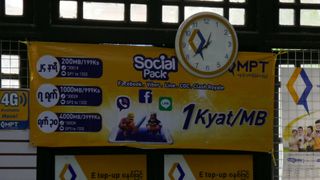
Myanmar’s mobile miracle is based upon two things; the ability to build apps – particularly for Android (the platform has a 92% market share here) – at relatively low price, and the flow of cash.
In a country without bank accounts, that cannot be understated. Jones says that having kiosks where people pay cash in and get cash out – all while using their mobile phone number as a substitute for a bank account – is critical.
“Consumers in many Asian markets are more likely to have a Facebook account than a bank account.”
Stuart Thornton, Worldpay
Financial services through a smartphone won’t stop here. Although Wave Money is focused on money transfers, it can also be used to buy airtime and, soon, pay bills and organise loans for farmers and small businesses from micro-finance companies.
Mobile agriculture is beginning to emerge in Myanmar too. Agriculturally-focused apps from network operator Ooredoo, as well as Farmer and Green Way gives farmers – who make up 80% of the workforce in Myanmar – everything from local weather forecasts and the latest crop prices to advice on specific crops and the law.
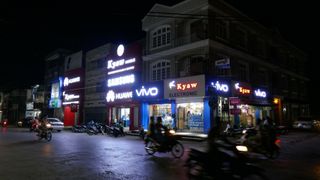
“High smartphone penetration means the latest information about crop prices is now being shared for the first time, democratising information that previously had been very difficult to access,” says Jones.
Farmers can now go to market knowing the latest prices for their crops and, indeed, decide whether to go at all.
Another example of how apps can change lives relatively easily and quickly in Myanmar is Ooredoo’s award-winning MayMay app, which offers maternal and child health advice to pregnant women in a country with high infant mortality rates – and has done so more than 30,000 times already.
“With apps like MayMay we are delivering services and tools that use this technology to help people improve their lives,” says Ross Cormack, CEO at Ooredoo Myanmar.
Showing the West the way
Once you spend time in Myanmar and look into the recent technological history, it’s easy to see how the company has leapt into becoming mobile-first. In the West, by comparison, most people are still used to traditional banks and are hard-wired to carry around bank cards.
Westerners don't even seem to have a use for the likes of Android Pay and Apple Pay. Even in the major market of the US only 7% now use Apple Pay once a week or more, which is hardly a significant change in how the economy works.
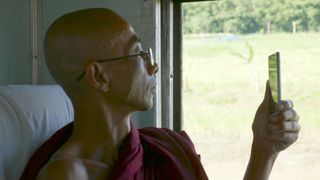
However, in emerging markets like Myanmar, neighbouring Bangladesh and Kenya – the latter the world's biggest mobile money market – smartphones and mobile money are proving transformative for the rural poor.
Go to any road-side stall, beer station or cafe in Myanmar and you can get served a bowl of noodles, a green tea or a beer while sitting beneath a photo of Aung San Suu Kyi, a major figurehead in the country’s march to democracy.
But while her image is everywhere, those $1 SIM cards selling in every kiosk are just as much of a testament to the rapid change engulfing this country.
That's Myanmar's mobile miracle.
Jamie is a freelance tech, travel and space journalist based in the UK. He’s been writing regularly for Techradar since it was launched in 2008 and also writes regularly for Forbes, The Telegraph, the South China Morning Post, Sky & Telescope and the Sky At Night magazine as well as other Future titles T3, Digital Camera World, All About Space and Space.com. He also edits two of his own websites, TravGear.com and WhenIsTheNextEclipse.com that reflect his obsession with travel gear and solar eclipse travel. He is the author of A Stargazing Program For Beginners (Springer, 2015),

